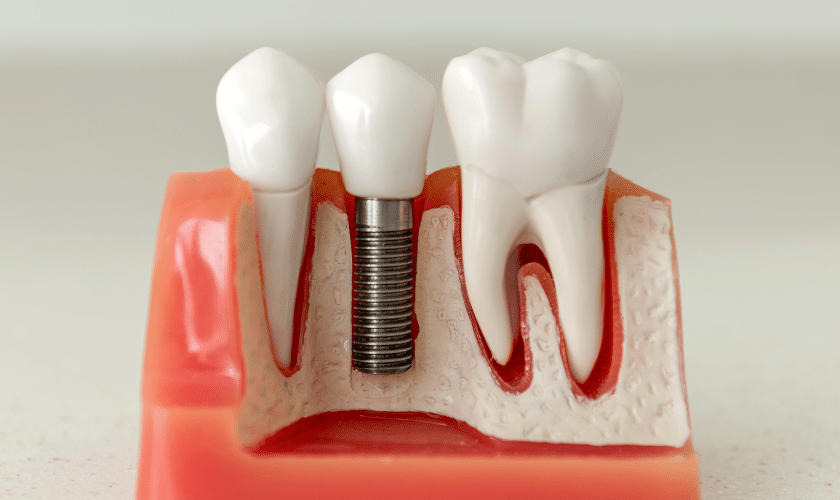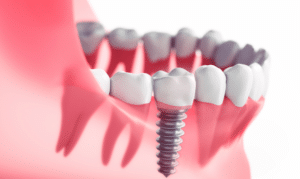Welcome to our blog post on how to care for your dental implants! If you’re one of the millions of people who have benefited from this revolutionary dental procedure, then you already know just how life-changing it can be. Dental implants provide a permanent solution for those missing teeth, restoring both functionality and confidence to your smile.
But like any investment, dental implants require proper care in order to maintain their longevity and effectiveness. In this article, we’ll explore the ins and outs of caring for your dental implants, including tips and tricks that will help you keep them looking and feeling great for years to come. So let’s dive in and discover everything you need to know about maintaining those pearly whites!
What Are Dental Implants?
Dental implants are essentially artificial tooth roots that are surgically placed into the jawbone to support replacement teeth or dental bridges. They are made of biocompatible materials, usually titanium, which fuse with the surrounding bone over time through a process called osseointegration.
Unlike dentures or removable bridges, dental implants provide a permanent solution for missing teeth. They not only look and feel like natural teeth but also function just as effectively. This is because they are securely anchored in the jawbone, ensuring stability and preventing any slippage or discomfort while eating or speaking.
The placement of dental implants requires careful planning and expertise from a skilled oral surgeon or implantologist. The procedure involves making an incision in the gum tissue to expose the underlying bone where the implant will be inserted. Once placed, it takes several months for the implant to integrate with the bone before a crown or bridge can be attached.
One of the greatest advantages of dental implants is their ability to prevent further bone loss in the jaw. When a tooth is lost, the surrounding bone begins to deteriorate over time due to lack of stimulation. By placing an implant in its place, this natural process is halted, preserving both your oral health and facial structure.
Dental implants offer an innovative solution for those seeking permanent tooth replacements. With proper care and maintenance, they can last a lifetime and greatly enhance your quality of life by restoring your smile’s appearance and functionality.
Benefits of Dental Implants
When it comes to replacing missing teeth, dental implants offer numerous benefits that can enhance both your oral health and overall quality of life. Here are some of the key advantages of choosing dental implants:
1. Improved Appearance: Dental implants look and feel like real teeth, seamlessly blending in with your natural smile. They provide a permanent solution for tooth loss, restoring your confidence in your appearance.
2. Enhanced Speech: Unlike dentures which can slip or cause mumbling, dental implants allow you to speak clearly without any concerns. Their stability ensures that you can communicate naturally and confidently.
3. Increased Comfort: Dental implants become a part of your mouth structure, eliminating discomfort associated with removable dentures or bridges. You won’t experience any soreness or irritation commonly experienced with other tooth replacement options.
4. Enhanced Chewing Efficiency: With their strong foundation securely anchored into the jawbone, dental implants restore full chewing power similar to natural teeth. This allows you to enjoy all types of foods without restrictions.
5. Long-lasting Solution: Properly cared for dental implants have the potential to last a lifetime, making them one of the most durable tooth replacement options available today.
6. Improved Oral Health: Unlike traditional bridges that require adjacent healthy teeth to be filed down for support, implant-supported crowns do not compromise adjacent teeth integrity.
7. Convenience and Convenience Carefree Maintenance: Dental Implants eliminate messy adhesives needed for removable dentures while also removing any worries about losing or misplacing them as they are fixed in place permanently within the jawbone.
Dental implants offer an array of benefits such as improved appearance, enhanced speech clarity comfort during eating meals , durability convenience minimal impact on surrounding healthy Teeth just some reasons why they are considered one of the best solutions for replacing missing teeth
Types of Dental Implants
When it comes to dental implants, there are different types available to cater to individual needs. Each type has its own unique characteristics and benefits. Let’s take a closer look at these options:
1. Endosteal Implants: This is the most common type of dental implant, which involves placing a titanium screw directly into the jawbone. Once the implant fuses with the bone, an artificial tooth is attached.
2. Subperiosteal Implants: For patients who lack sufficient bone density for traditional implants, subperiosteal implants are a suitable alternative. These implants are placed on top of the jawbone but beneath the gum tissue.
3. All-on-4 Implants: Designed for those with multiple missing teeth or complete tooth loss in one or both arches, this technique uses four strategically placed implants to support a full set of replacement teeth.
4. Mini Dental Implants: Smaller in size compared to standard implants, mini dental implants can be used in cases where space or bone structure is limited.
5. Zygomatic Implants: These specialized implants are used when there is not enough upper jawbone for regular implant placement and involve anchoring the implant into the cheekbone instead.
It’s important to consult with your dentist or oral surgeon to determine which type of dental implant would best suit your specific situation and restore your smile effectively.
How to Care For Your Dental Implants
Dental implants are a fantastic solution for those missing teeth. They not only restore your smile but also provide stability and function that is similar to natural teeth. However, caring for dental implants is essential to maintain their longevity and ensure optimal oral health.
It’s crucial to practice excellent oral hygiene habits. Brush your teeth at least twice a day using a soft-bristle toothbrush and non-abrasive toothpaste. Pay extra attention to the areas around the implant, as plaque buildup can lead to gum inflammation or even infection.
Flossing should not be neglected either! Use unwaxed floss or interdental brushes specifically designed for implant care to clean between your implant-supported teeth. This removes any debris or bacteria that brushing alone may miss.
Regular dental check-ups are vital when you have dental implants. Your dentist will perform professional cleanings and examine the implants to ensure they’re in good condition. If any issues arise, early intervention can prevent further complications down the road.
Avoid chewing on hard foods or using your teeth as tools, as this can put unnecessary stress on the implants and potentially damage them. Additionally, limit consumption of sugary foods and drinks that could contribute to decay around the implant site.
If you participate in sports activities prone to facial injuries, consider wearing a mouthguard designed specifically for use with dental implants.
By following these tips and making proper care of your dental implants a priority, you can enjoy their benefits for many years to come! Remember: prevention is always better than cure when it comes to maintaining healthy smiles with dental implants!
Common Mistakes to Avoid
1. Neglecting Oral Hygiene: One of the most common mistakes people make after getting dental implants is neglecting their oral hygiene routine. Remember, even though dental implants are artificial teeth, they still require regular care and maintenance.
2. Using the Wrong Toothpaste: Avoid using abrasive toothpaste that can scratch the surface of your dental implants. Look for a toothpaste specifically formulated for use with dental implants or ask your dentist for recommendations.
3. Skipping Dental Check-ups: Regular visits to your dentist are crucial for maintaining the health of your dental implants. Your dentist will check the condition of your gums and implant posts, ensuring everything is in optimal shape.
4. Ignoring Signs of Infection: If you notice any signs of infection such as swelling, redness, or pain around your implant site, don’t ignore them! Contact your dentist immediately to prevent further complications.
5. Grinding Teeth: Bruxism (teeth grinding) can damage both natural teeth and dental implants over time. Consider wearing a nightguard while sleeping to protect against this habit.
6. Smoking and Excessive Alcohol Consumption: Smoking and excessive alcohol consumption can interfere with proper healing after implant surgery and increase the risk of complications such as infections or implant failure.
Tips for Optimizing Your Oral Hygiene
Maintaining optimal oral hygiene is crucial for the longevity and success of your dental implants. By following these tips, you can ensure that your implants stay clean, healthy, and free from complications.
1. Brushing: Use a soft-bristle toothbrush and fluoride toothpaste to gently brush your teeth at least twice a day. Pay extra attention to the areas around your implants, ensuring that you remove any plaque or food particles.
2. Flossing: Regular flossing is essential in preventing gum disease and keeping your implant-supported teeth in top condition. Opt for waxed or implant-specific floss to avoid damaging the surrounding tissues.
3. Interdental Brushes: These tiny brushes are designed to reach between teeth and around dental implants where traditional brushing may not be as effective. Incorporating interdental brushes into your routine can help remove debris from hard-to-reach areas.
4. Mouthwash: Consider using an antimicrobial mouthwash recommended by your dentist to reduce bacteria buildup and maintain fresh breath.
5. Regular Dental Visits: Schedule regular check-ups with your dentist so they can monitor the health of both your natural teeth and dental implants. Professional cleanings will also help preserve their appearance and functionality.
6. Avoid Smoking & Excessive Alcohol Consumption: Tobacco products and excessive alcohol consumption can have detrimental effects on oral health, increasing the risk of complications with dental implants such as infections or implant failure.
7. Healthy Diet Choices: A nutritious diet rich in vitamins and minerals supports overall oral health, including the integrity of dental implants.
By implementing these simple yet effective strategies into daily practice, you can optimize your oral hygiene routine while safeguarding the long-term durability of your dental implants!
In the realm of dental care, understanding how to properly care for your dental implants is crucial. By following these tips and tricks, you can ensure the longevity and success of your dental implants.
Remember that dental implants are a permanent solution for missing teeth. They offer numerous benefits, such as improved appearance, enhanced chewing ability, and increased self-confidence. With proper care, they can last a lifetime!
There are different types of dental implants available to suit individual needs. Whether it’s endosteal or subperiosteal implants, consult with your dentist to determine which option is best for you.
FAQ
Q: Are dental implants painful?
A: The procedure itself is usually done under local anesthesia, so you won’t feel any pain during the surgery. However, mild discomfort and swelling are common after the procedure, but this can be managed with over-the-counter pain medication.
Q: How long do dental implants last?
A: With proper care and maintenance, dental implants can last a lifetime. Regular visits to your dentist for check-ups and cleanings will help ensure the longevity of your implants.
Q: Can anyone get dental implants?
A: In general, most people who have good oral health and sufficient bone density in their jaw are suitable candidates for dental implant surgery. However, certain medical conditions such as uncontrolled diabetes or heavy smoking may affect the success of the procedure.





